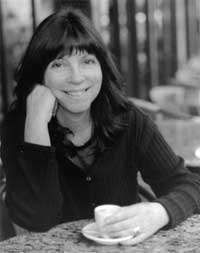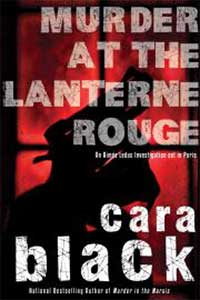
Paris murder mystery author Cara Black has just come out with a new novel “Murder at the Lanterne Rouge.”·. Black lives in San Francisco but comes to Paris frequently to soak up the atmosphere, follow-up on promising leads, and interview anyone she can find – from prostitutes to river workers – that can offer her a glimpse into what really goes on in the dark corners of the city.··She will be back in Paris talking about her new book at The American Library (June 6, 7:30pm).
This series stands out because of the very strong sense of place that you create. You could say that Paris is a character in the books, right?
Thanks. I like to think that Paris is a character in my books. Sense of place, that unique part of Paris that speaks to me drives the story. Paris is really a collection of villages, twenty arrondissements or districts that each have a flavor. I try to think why crime would occur here in this quartier of Paris, what crime would hapen here, who lives here, what is the distinct taste of this quartier of Paris and then the story comes.
How did you come up with your protagonist, Aimee Leduc? Is she based on a real person, or did she just appear to you?
I knew I couldn’t write as a French woman, I can’t even tie my scarf the right way but I grew up in a Francophile family; my father loved good food and wine, I attended a Catholic school with French nuns and I lived in Europe when I was younger. I interviewed three female detectives in Paris who ran their own detective agency and took qualities from each. It was important to me that Aimée be a young, contemporary woman like the Parisian women I know, have a strong fashion sense and be fierce in her pursuit of justice. The justice that eludes people sometimes in daily life. And that she know much more about computers than I do.
Can you tell us about your first book, and about how you decided to expand it into a series?
Funny, but I never planned to write a series. And now eight books later, I’d like to say I had a master plan but the series with Aimee Leduc has just evolved. In Murder in the Marais, my first book, I just wanted to tell the story of my friend’s mother, a young Jewish girl who hid in the Marais during the German Occupation of Paris in WWII. My friend’s mother was 14 years old and came home from school one day to find her family gone. She stayed in the apartment, went to school, hoping they would return. A year later, in 1944 at Liberation, she searched for them at the train stations, at the Hotel Lutetia on the Left Bank where the Red Cross had a terminus center for returning deportees and she found they’d gone to Auschwitz. My friend told me this story one day in the Marais and it touched me. Years later when I returned to Paris in the mid 1990’s the story came back to me and I wanted to explore these issues of the past, lingering anti-Semitism and how war still touched every generation.
Why do you think that mysteries are so popular?
Maybe mysteries help us deal with the frustration and unresolved situations we encounter in daily life. When I read a mystery I like to experience some sense that justice is served. Not that all the loose ends are tied up but that good in some form triumphs.
 How do the French respond to your books?
How do the French respond to your books?
There’s a big expat English speaking community in France and my books are sold in English language bookstores. Murder in the Sentier, the 3rd book in the series, has just been translated into French and came out there about three weeks ago. I know it’s in bookstores, my Paris friends have told me they’ve seen it, but I have no clue as to the reception. And I’m dying to find out.
Could these stories take place anywhere else, or do they belong only in Paris?
For me these stories can only happen in Paris. No where else. I’m exploring the darker side of the City of Light.
You have said that you belong to a writing group. What do you do when their reaction is at variance with your own opinion of what you’ve written?
My writing group meets twice a month and we critique each other’s work in progress. I’m an equal member and receive comments like everyone else. I’m always looking to make my story better. It’s important to listen to the comments, take what makes sense or would make the story clearer, deepen or enhance it. Or even delve more into the character, strengthen what would be more organic to the plot. If several people make the same comments, I listen.
What advice do you have for aspiring mystery writers?
Write what you are passionate about – that’s the best advice I ever received.
To order a signed copy of her latest book: http://www.carablack.com

